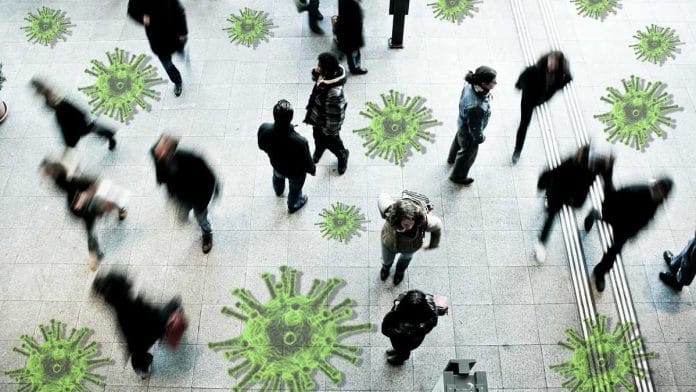New Delhi: A study by the UK’s health department has found that the production of anti-spike or anti-nucleocapsid antibodies in response to Covid-19, is likely to last at least six months, and that it “was associated with a substantially reduced risk of SARS-CoV-2 reinfection in the ensuing 6 months.”
The spike and the nucleocapsid proteins, present on the surface of the coronavirus, are the main immunogens, i.e., create an immune response in the body in the form of anti-spike and anti-nucleocapsid antibodies, which are specific to these parts of the coronavirus.
The study followed 12,541 healthcare workers from the Oxford University Hospitals, which is a trust of four hospitals under the National Health Service, and sought to assess the incidence of Covid-19 in seropositive participants (those with antibodies) as compared to seronegative participants (those without antibodies).
The healthcare workers were tracked for 31 weeks to determine their risk of Covid-19 infection as well as check the longevity of Covid immunity.
“The incidence of positive PCR tests was inversely associated with anti-spike antibody titers (levels),” said the study, adding, “the presence of anti-spike antibodies was associated with a substantially reduced risk of PCR-confirmed SARS-CoV-2 infection over 31 weeks of follow-up.”
The study was published Wednesday in the New England Journal of Medicine.
Also read: Indian scientists discover ‘dance’ of Covid spike proteins, could help design vaccines
Details of the study
Of the 12,541 healthcare workers who were studied, 11,364 were seronegative when the study began and 1,177 were positive. During the course of the study, 88 participants turned seropositive, taking that number up to 1,265.
Participants were swabbed for PCR testing every two weeks, and checked for antibodies every two months between 23 April to 30 November this year.
Two antibody assays (investigative procedures) were employed in the study — the anti-spike ELISA test (enzyme-linked immunosorbent assay) by the University of Oxford, and an anti-nucleocapsid IgG assay designed by Abott.
A total of three healthcare workers who were seropositive at the beginning of the study turned PCR positive, indicating a reinfection. One participant had tested positive for the anti-spike test, one tested positive for the anti-nucleocapsid test, and a third had tested positive for both.
“Of 11,364 health care workers with a negative anti-spike IgG assay, 223 had a positive PCR test,” said the study, further noting, “Of 1,265 health care workers with a positive antispike IgG assay, 2 had a positive PCR test (0.13 per 10,000 days at risk), and both workers were asymptomatic when tested.”
Also read: Antibodies that attack body and not virus found in 10% patients with severe Covid, study says
Low rate of reinfection
According to the study, “no symptomatic infections and only two PCR-positive results among asymptomatic health care workers were seen in those with anti-spike antibodies, which suggests that previous infection resulting in antibodies to SARS-CoV-2 is associated with protection from reinfection for most people for at least 6 months”.
The study conceded that it could not conduct sequencing on the cases of reinfection because neither were original samples properly stored nor did it assess the levels of T-cell antibodies.
“In this study, we found a substantially lower risk of reinfection with SARS-CoV-2 in the short term among health care workers with anti-spike antibodies and those with anti-nucleocapsid antibodies than among those who were seronegative,” concluded the study.
Also read: Some Covid-19 antibodies could last in recovered patients for at least 6 months, study finds






